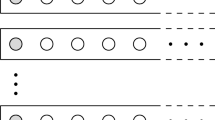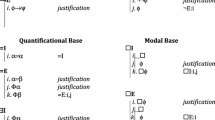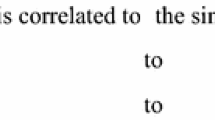Abstract
The trouble with modal logic, according to its critics, is quantification into modal contexts—i.e. de re modality. For on the basis of such quantification, it is claimed, essentialism ensues, and perhaps a bloated universe of possibilia as well. The essentialism is avoidable, these critics will agree, but only by turning to a Platonic realm of individual concepts whose existence is no less dubious or problematic than mere possibilia. Moreover, basing one’s semantics on individual concepts, it is claimed, would in effect render all identity statements containing only proper names either necessarily true or necessarily false i.e. there would then be no contingent identity statements containing only proper names.
Access this chapter
Tax calculation will be finalised at checkout
Purchases are for personal use only
Preview
Unable to display preview. Download preview PDF.
Similar content being viewed by others
Bibliography
J. Bacon. Substance and first-order quantification over individual concepts. J. Symbolic Logic, 45, 193–203, 1980.
E. W. Beth. Extension and Intension. Synthese, 12, 375–379, 1960.
On the eliminability of de re modalities in some systems. Notre Dame J. Formal Logic, 17, 79–88, 1976.
R. Carnap. Foundations of logic and mathematics. In International Encyclopedia of Unified Science, Vol. 1, Univ. Chicago Press, 1938.
R. Carnap. Modalities and quantification. J. Symbolic Logic, 11, 33–64, 1946.
R. Carnap. Meaning and Necessity. Univ Chicago Press, 1947.
R. Carnap. Notes on Semantics. Published posthumously in Philosophia(Phil.Quant. Israel), 2, 1–54 (1972).
R. Carnap. Introduction to Symbolic Logic and its Applications. Dover Press, 1958.
N. B. Cocchiarella. Logical atomism, nominalism, and modal logic. Synthese, 3, 23–62, 1975.
N. B. Cocchiarella. On the primary and secondary semantics of logical necessity. Journal of Philosophical Logic, 4, 13–27, 1975.
K. Fine. Failures of the interpolation lemma in quantified modal lgoic. J. Symbolic Lo_gic, 44, 201–206, 1979.
P. Geach. Reference and Generality, Cornell Univ. Press, 1962.
A. Gibbard. Contingent identity. J. Philosophical Logic, 4, 187–221, 1975.
J. Hintikka. Identity, variables and inpredicative definitions. J. Symbolic Logic, 21, 225–245, 1956.
J. Hintikka. Models for Modalities, Reidel, Dordrecht, 1969.
J. Hintikka. Time and Necessity, Oxford University Press, 1973.
J. Hintikka. Is alethic modal logic possible? Acta Phil. Fennica, 35, 227–273, 1982.
J. A. W. Kamp. Formal properties of ‘Now’. Theoria, 37, 227–273. 1971.
J. A. W. Kamp. Two related theorems by D. Scott and S. Kripke. Xeroxed, London, 1977.
S. Kanger. Provability in Logic, Univ. of Stockholm, 1957.
S. Kripke. A completeness theorem in modal logic. J. Symbolic Logic, 24, 1–14, 1959.
S. Kripke. The undecidability of monadic modal quantification theory. Zeitsch f. Math. Logic und Grundlagen d. Math, 8, 113–116, 1962.
S. Kripke. Sematnical considerations on modal logic, Acta Philosophica Fennica, 16, 83–94, 1963.
S. Kripke. Identity and necessity. In M. Munitz, ed. Identity and Individuation, New York University Press, 1971.
S. Kripke. Letter to David Kaplan and Richmond Thomason. March 12, 1976.
J. Lyons. Semantics, Cambridge Univ. Press, 1977.
T. McKay. Essentialism in quantified modal logic. J. Philosophical Logic, zbf 4, 423–438, 1975.
R. M. Montague. Logical necessity, physical necessity, ethics and quantifiers. Inquiry, 4, 259–269, 1960. Reprinted in R. Thomason, ed. Formal Philosophy, Yale Univ. Press, 1974.
Z. Parks. Investigations into quantified modal logic — I. Studia Lgoica, 35, 109–125, 1976.
T. Parsons. Essentialism and quantified modal logic. Philosophical Review, 78, 35–52, 1969.
A. N. Prior. Past, Present and Future, Oxford Univ. Press, 1967.
H. Putnam. Time and physical geometry. J. Philosophy, 64, 240–247, 1967. Reprinted in Mathematics, Matter and Method, Phil. Papers, Vol. 1, Cambridge Univ. Press, 1975.
F. P. Ramsey. In R. B. Braithwaite, ed. The Foundation of Mathematics, Littlefield, Adams, Paterson, 1960.
E. Saarinen. Backwards-looking operators in tense logic and in natural language. In J. Hintikka et al., eds. Essays on Mathematical Logic, D. Reidel, Dordrecht, 1976.
W. Sellars. Grammar and existence: a preface to ontology. In Science, Perception and Reality, Routledge and Kegan Paul, London, 1963.
A. Smullyan. Modality and description. J. Symbolic Logic, 13, 31–37, 1948.
R. Thomason. Modal logic and metaphysics. In K. Lambert, ed. The Logical Way of Doing Things, Yale Univ. Press, 1969.
F. Vlach. ‘Now’ and ‘then’: a formal study in the logic of tense anaphora. PhD Dissertation, UCLA, 1973.
G. H. von Wright. An Essay in Modal Logic, North-Holland, Amsterdam, 1951.
Author information
Authors and Affiliations
Editor information
Editors and Affiliations
Rights and permissions
Copyright information
© 2002 Springer Science+Business Media Dordrecht
About this chapter
Cite this chapter
Cocchiarella, N.B. (2002). Philosophical Perspectives on Quantification in Tense and Modal Logic. In: Gabbay, D.M., Guenthner, F. (eds) Handbook of Philosophical Logic. Handbook of Philosophical Logic, vol 7. Springer, Dordrecht. https://doi.org/10.1007/978-94-017-0462-5_4
Download citation
DOI: https://doi.org/10.1007/978-94-017-0462-5_4
Publisher Name: Springer, Dordrecht
Print ISBN: 978-90-481-6011-2
Online ISBN: 978-94-017-0462-5
eBook Packages: Springer Book Archive




